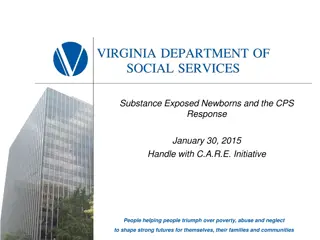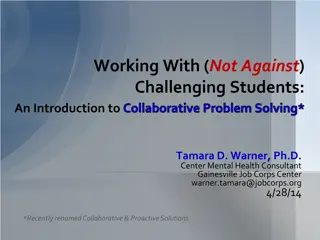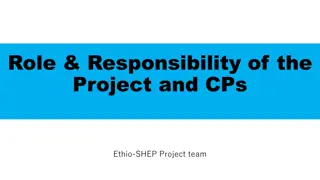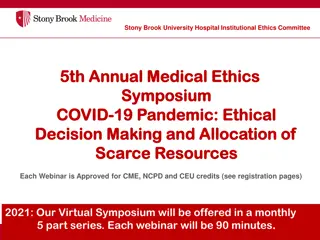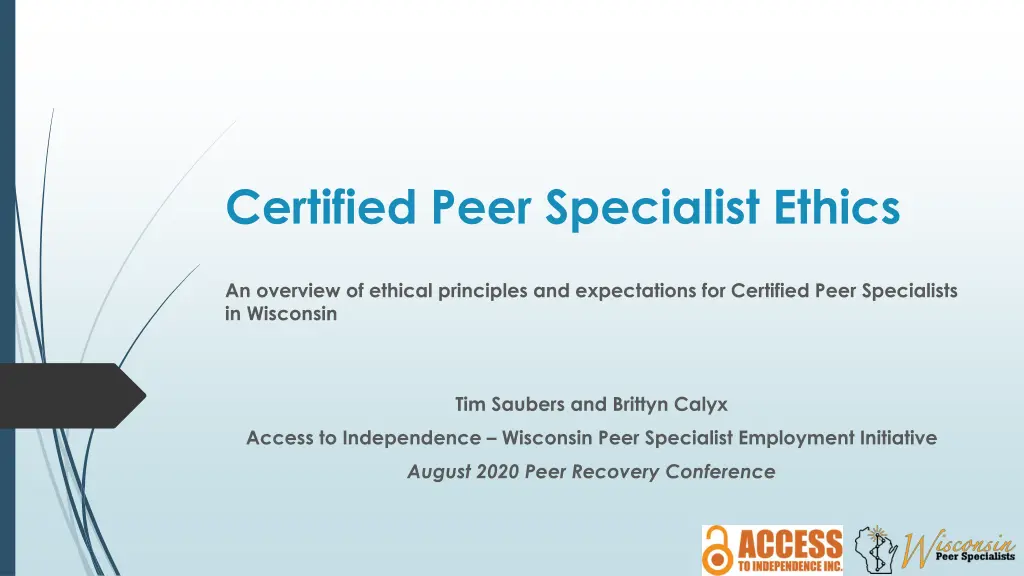
Understanding Certified Peer Specialist Ethics in Wisconsin
Explore the ethical principles and expectations for Certified Peer Specialists in Wisconsin, focusing on peer support principles, connecting with the CPS Code of Ethics, and the origins of peer support principles rooted in civil rights movements.
Download Presentation

Please find below an Image/Link to download the presentation.
The content on the website is provided AS IS for your information and personal use only. It may not be sold, licensed, or shared on other websites without obtaining consent from the author. If you encounter any issues during the download, it is possible that the publisher has removed the file from their server.
You are allowed to download the files provided on this website for personal or commercial use, subject to the condition that they are used lawfully. All files are the property of their respective owners.
The content on the website is provided AS IS for your information and personal use only. It may not be sold, licensed, or shared on other websites without obtaining consent from the author.
E N D
Presentation Transcript
Certified Peer Specialist Ethics An overview of ethical principles and expectations for Certified Peer Specialists in Wisconsin Tim Saubers and Brittyn Calyx Access to Independence Wisconsin Peer Specialist Employment Initiative August 2020 Peer Recovery Conference
Who We Are Tim Saubers, Peer Specialist Program Manager with the Wisconsin Peer Specialist Employment Initiative and Access to Independence Brittyn Calyx, Peer Specialist Program Communications Assistant (works with Tim) Both worked as Wisconsin Certified Peer Specialists and in supervisory roles prior to current positions
Why Were Here Talking about peer support principles beyond the buzzwords Honoring the grey in ethics (wrestling encouraged!) Moving away from one-size-fits-all, prescriptive approaches to navigating ethical conversations Challenging assumptions and leaning into discomfort Supporting an engaged Certified Peer Specialist workforce and encouraging critical thinking in ethics questions Why are you here today?
Connecting Peer Support Principles and the Wisconsin CPS Code of Ethics
Peer Support Principles: An overview Centers mutuality and genuine relationships of support Recognizes the validity of multiple pathways to self-defined recovery Aims to understand the role trauma can play in people s lives and offer trauma-informed peer support Advocates a person-centered (or self-directed) approach to healing rather than one-size-fits-all solutions Connects with others from a place of curiosity Respects and views the people they support (peers) as the experts in their own lives and experiences Offers support based in the recognition of personal strengths/assets (strengths-based) rather than defects, deficits, or diagnoses centered in pathology Places the principle of self-determination in a foremost position when navigating ethical questions
Origins of Peer Support Principles The civil rights struggles and movements of the 1960s and 1970s heavily influenced the values, agendas, and aims of communities of peers with lived experience: Deinstitutionalization and Disability Rights movements highlighted harms done by service systems and the value of community-based peer supports. Multiple tendencies and approaches came into being for advocating for peer support and better quality of life for those with lived experience. Mad Pride Movements Consumer-Control and Independent Living Philosophy Consumer/(Psychiatric) Survivor/Ex-Patient Movements Systems-funded Peer-based Initiatives (including billable Certified Peer Specialist services) Community-specific Peer Support and Aid Organizations
Commonalities in These Tendencies All frameworks influenced and shaped by era of deinstitutionalization Inspiration and organizing tactics gained from various civil rights movements Value placed on shared lived experience and mutual support/empowerment Choice and self-determination is central Some found and continue to find empowerment in reclaiming language used against them or labels once put upon them; others may not Shared histories speak to the need to reaffirm our principles, resist co- optation of peer support language, clarify our roles and values to funding streams, and work to affect societal and systemic change
Wisconsin Certified Peer Specialist Code of Ethics
What is the Code of Ethics? An outline of some of the principles intended to guide Certified Peer Specialists in their professional role and work One of the core documents clarifying the Wisconsin Certified Peer Specialist role (see also: Scope of Practice, Core Competencies) Initially drafted between 2007 and 2009 by the Peer Specialist Committee of the Recovery Implementation Task Force (RITF) After collaborations between the RITF, Access, DHS, and other stakeholders, document sent on to DHS for final review, editing, and publishing. Minor wording changes and updates in years since https://www.dhs.wisconsin.gov/publications/p00972a.pdf https://www.wicps.org/about-us/
Considerations and Use Certified Peer Specialists should use the Code of Ethics not as a prescriptive template to determine response to each and every ethical question, but as guide to struggle with and work through these questions. Contradictions exist, and this underscores the greyness of ethics in any professional role. Interpretation and implementation varies in different workplaces and settings. This is the conversation starter, not the conversation ender.
Themes in the Code of Ethics Part of a recovery and resilience model Self-determination (no undue influence) Recognition of power dynamics in professional role Transparency and informed-consent Advocate for self-determination and choice Supervision meant to support the recovery-orientation Supportive of peers dignity, rights, and privacy Self-awareness and professional responsibility Relationship to Scope of Practice
Revisiting the WI CPS Code of Ethics Selected items for discussion: Code of Ethics #1, #4, #8, #9, #11, #12, #14
1. I understand that my primary responsibility is to help peers understand recovery and achieve their own recovery needs, wants, and goals. I will be guided by the principle of self-determination for each peer. Considerations: The primary responsibility here and primary function in Scope of Practice differ. How do Certified Peer Specialists understand recovery? Self-determination is the only clearly referenced principle in this document. Why do you think that is?
4. I have a duty to inform peers when first discussing confidentiality that intended serious harm to self or others cannot be kept confidential. I have a duty to accurately inform peers regarding the degree to which information will be shared with other team members, based on my agency policy and job description. I have a duty to inform appropriate staff members immediately about any intended serious harm to self or others or abuse from caregivers. Considerations: Informed-consent principles are highlighted here though the term is not used. The interpretation of this fourth item in the Code of Ethics may vary widely from agency to agency. Be sure to know what your agency requires of you according to their policies and procedures. Appropriate staff members also vary from agency to agency. We must question one-size-fits-all approaches like this when they directly conflict with peer support principles of self-determination and choice. Advocacy in the workplace can take place here.
8. I will not engage in sexual or any form of intimate activities with any peers I am currently serving, and for a minimum of one year after my peer services end. I will also not enter into dual relationships or commitments that may conflict with the interests of peers I support. Considerations: When determining if any potential dual relationships or commitments may conflict with the interests of the peers I support, it s important to consult those peers. The Scope of Practice tells us that Certified Peer Specialists are expected to mutually establish acceptable boundaries with the peers and agree to discuss on an ongoing basis as needed.
9. I will keep current with emerging knowledge relevant to recovery and openly share this knowledge with my coworkers and peers. I will refrain from sharing advice or opinions outside my scope of practice with peers. Considerations: If Certified Peer Specialists view recovery as self-defined and center a belief in multiple pathways, why are we asked to share emerging knowledge with peers? What sources for emerging knowledge are considered valid or supported in our workplaces? Sometimes the last sentence is used to state that Certified Peer Specialists should not be having conversations about medication, religion/spirituality, client rights, and so on to any degree. How do we come to a more nuanced understanding here? How do we discuss these topics within the role and scope of a CPS?
11. I will not accept gifts of money or items of significant value from those I serve. I will not loan or give money to peers. Considerations: Remember, ethics are grey. Some of these items listed in the Code of Ethics read as rules and are fairly prescriptive. How do we navigate commonly requested loans or gifts in our workplaces (money for bus passes/ridesharing, cigarettes, food, etc.)? Finding programmatic and workplace solutions can help individual Certified Peer Specialists navigate ethical questions with more ease. When does human decency conflict with the statement above? What is considered significant value?
12. I will protect the welfare of all peers by ensuring that my conduct will not constitute physical or psychological abuse, neglect, or exploitation. I will practice with trauma awareness at all times. Considerations: Language has an impact on the culture of our workforce and the services we offer. What if instead of protect we were to respect? What happens when we see ourselves as protectors? The last sentence is somewhat vague as it currently reads. The importance is to realize that our actions have an impact, whether that was the intent or not. We must acknowledge the reality of the impact we have in the lives of those we support. This is also where learning from trauma-informed approaches comes into play.
14. As a professional, if I find that my own recovery journey is compromised and interferes with my ability to provide support to my peers, I will engage in my own self-care until such time that I am once again capable of providing professional care. Considerations: What is the motivation for including this final item in the Code of Ethics? Remember that recovery is self-defined and we value multiple pathways. Sometimes in the midst of our greatest struggles, we are able to offer the most connective and effective support. How can we look on this from a strengths-based approach, acknowledging the value in multiple pathways, and move to a less fear-based place. What assumptions or stigmas show up within our core documents?
Resources Deeper Diving https://transformation-center.org/wp-content/uploads/2012/06/CPS-Code- of-Ethics-2015.pdf (MA CPS Code of Ethics existed prior to WI CPS) https://www.gmhcn.org/cps-ethics (GA CPS Code of Ethics existed prior to WI CPS) https://www.samhsa.gov/brss-tacs/recovery-support-tools/peers/core- competencies-peer-workers (SAMHSA Core Competencies for Peer Workers)
Questions? Reflections? Contact info: Tim: tims@accesstoind.org Brittyn: brittync@accesstoind.org
2. I will conduct myself in a manner that fosters my own recovery and I recognize the many ways in which I may influence peers and others in the community, as I serve as a role model. Considerations: An acknowledgement that we are oftentimes placed in a role model or expert role is important when it comes to recognizing power dynamics. However, this role model role has some serious pitfalls and flaws when embraced in practice (paternalism, saviorism, preference for certain recovery pathways). A Certified Peer Specialist is the expert at not being the expert.
3. I will be open to share with peers and coworkers my stories of hope and recovery and will likewise be able to identify and describe the supports that promote my recovery and resilience. Considerations: The peer role is highlighted here. Effective use of self-disclosure and shared lived experience are valued in ethical conversations rather than shunned. What guidelines are shown here for self-disclosure?
5. I will never intimidate, threaten, harass, unduly influence, physically force or restrain, verbally abuse, or make unwarranted promises of benefits to the peers I support. Considerations: This may seem obvious when first read, but we can also see the origins and roots of peer support principles here. Notice the language, unduly influence. This is important, as coercion still manifests in service systems today in both overt and more subtle ways. Certified Peer Specialists do not engage in restraint and seclusion measures, and peer supporters across the world advocate for an end to such practices. Honesty and transparency is crucial for cultivating a genuine, peer relationship built upon a foundation of trust and respect.
6. I will not practice, condone, facilitate, or collaborate in any form of discrimination on the basis of ethnicity, race, sex, sexual orientation, gender identity, age, religion, national origin, marital status, political belief, disability, or any other preference or personal characteristic, condition or state. Considerations: Not only are we called to not practice discrimination, but we are guided to not condone, facilitate, or collaborate in discriminatory practices. It is becoming widely recognized that various service systems, including the mental health and substance use service systems to this day perpetuate systemic racism and other systemic injustices. Discrimination and other forms of oppression are not always intentional or overt. Still, when we are called to not collaborate here, our role as agents of change is solidified.
7. I will advocate with peers so that individuals may make their own decisions when partnering with professionals. Considerations: Notice that Certified Peer Specialists advocate with their peers, not for them. The primary purpose of this co-advocacy mentioned in the Code of Ethics is for centering self-determination and choice. When systems create barriers to choice and free decision making, advocacy may include naming these barriers and advocating for change.
10. I will utilize supervision and abide by the standards for supervision established by my agency. I will seek supervision to assist me in providing recovery-oriented services to peers. Considerations: Supervision is seen as a useful professional tool in the Certified Peer Specialists toolbox. Abiding by the standards for supervision established by your agency, does not mean you should not advocate for changes to your supervisory structure. The goal of supervision is to grow professionally and offer better recovery-oriented peer support.
13. I will, at all times, respect the rights, dignity, privacy, and confidentiality of those I support. Considerations: Clear and simple. Many of us may be quick to say we follow this in our work at all times. However, we encourage you to wrestle with this. Are rights and dignity respected in workplaces where police are called on people experiencing emotional distress without their consent? To what degree to we maintain dignity and privacy in our staff meetings, supervision, documentation, and so on? Is informed-consent a one-time event in your workplace or an ongoing process?










